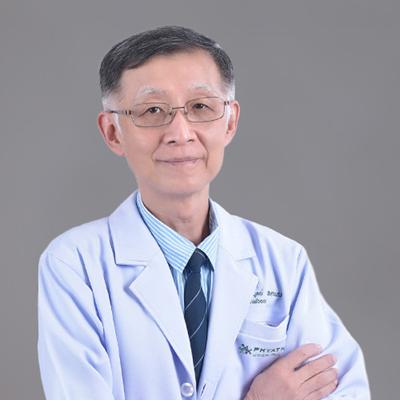
Dr. Phaibool Asawalertsang
ព័ត៌មានទូទៅ
“Quality of life, happiness, peace of mind, and the patient’s family come first—before deciding on the most suitable treatment plan.”
Heart disease patients can be treated in many ways, such as lifestyle changes, healthy eating, and medication. These all play a key role in improving long-term health. However, if symptoms are severe, treatments may involve surgery, cardiac catheterization, or other procedures, depending on the situation.
Experience leads to understanding patients’ lives—and tailored treatment
Dr. Paiboon Asawalertsang, a cardiologist at Paolo Phaholyothin Hospital, has over 22 years of experience treating heart disease patients. This has given him deep insight into the needs of both patients and their families. Most heart patients are elderly, and the outcome of their treatment depends on two key factors: the patient themselves, and the appropriateness of the treatment approach chosen by the medical team.
“Achieving satisfactory treatment results requires cooperation from the patient, the doctor’s experience, and the appropriate use of medical technology. These elements must go hand in hand. Each patient is different—even if they have the same disease, the treatment approach may need to vary depending on their willingness and ability to cooperate. That’s why doctors must communicate clearly, explain the reasons and expected outcomes.”
The Pre-treatment process is Just as important as the treatment itself
“Some patients may get irritated if we ask too many questions,” says Dr. Paiboon. That’s why he opts for a gentle, gradual approach when speaking with elderly patients—never rushing—to build trust. He conducts further assessments such as heart X-rays, blood tests, and lung checks to ensure an accurate diagnosis before creating a personalized treatment plan. Sometimes, he involves the patient’s family to help communicate symptoms or observe conditions during treatment.
Cost-effectiveness in treatment—A core principle
While there are medical standards and protocols to follow, what truly matters most is the patient’s quality of life, happiness, and peace of mind, along with the well-being of their family. Even patients with the same disease may lead very different lives and have different backgrounds, so their care must reflect that. Dr. Paiboon adapts treatment strategies to provide the greatest benefit to each individual.
For example, he recalls a 90-year-old patient with severe symptoms. Technologically advanced procedures were available, but they would have involved surgery, pain, high costs, and potential complications. While surgery might have extended the patient’s life, it wouldn’t have guaranteed true happiness or peace. After discussing all perspectives with the patient and family, they chose a more conservative route—medication, dietary guidance, and a simple, comfortable lifestyle. No invasive devices, no risky surgery.
“Seeing patients happy and living comfortably—that’s satisfaction for me,” Dr. Paiboon says. “It’s about providing care that fits their stage of life, not about using the latest innovation, but about what’s truly suitable.”
សិក្សា
- 2523 – 2529 แพทยศาสตรบัณฑิต, มหาวิทยาลัยมหิดล
- 2532 – 2535 สาขาอายุรศาสตร์, โรงพยาบาลจุฬาลงกรณ์ (แพทยสภา)
- 2535 – 2538 อายุรศาสตร์โรคหัวใจ, โรงพยาบาลจุฬาลงกรณ์ (แพทยสภา)